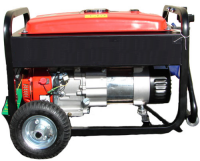The hurricane season is now upon us and forecasters are predicting above average activity levels. Those in the northeast last year, experienced the wrath of Super Storm Sandy with some outages lasting several weeks. If you’re concerned about the upcoming hurricane season and future storms, now may be the time to start thinking about investing in a generator to power your home or business when the electricity goes out. Should you invest in an automatic or portable generator?
 This hurricane season could be destructive
This hurricane season could be destructive
This season forecasters are predicting 18 named storms, nine hurricanes and four intense category 3 or stronger hurricanes. As a reference point, last season there were twice as many storms as were predicted. Hopefully, it won’t that bad, but you should still be prepared.
What are the benefits for purchasing a generator?
For one, you will have electricity when the main source of power goes out. You also will negate the risk of appliances malfunctioning in the future and air conditioning units causing leaks and mold in your home. Also, you’ll be able to keep all perishable items in your refrigerator. Lastly, many of the insurance companies provide for a 5% reduction in your homeowners insurance policy if you have an automatic stationary generator.
What’s the main drawback?
Generators are not cheap. Many of the best ones on the market cost more than $5,000 plus installation for a typical home. The price can vary substantially based on the size of the home and the required kilowatts to power all circuits and appliances.
Should you buy a stationary or portable generator?
The automatic stationary generator is your best option for a number of reasons. The generator will automatically turn on when the power goes out, extension cords aren’t necessary, it’s fuel efficient, secure, adds value to the home and results in a 5% home insurance premium discount. A portable one can work for emergencies or for a quick fix, but they generally aren’t your best option. They can be dangerous, they require constant refueling, can be subject to corrosion, and are generally more inconvenient than a stationary generator. We understand though that not everyone can afford a stationary generator as the cost is typically 3 to 5 times the price of a portable and the installation fee to connect to a gas or propane line can cost $3,500 or more. That’s another point to consider. Stationary generators require that you have an easily accessible gas or propane line to attach to the equipment.
More Questions? Browse answers or ask your insurance questions online. Also, you can find small business accountants online.
Related Articles
->Should I Get Mortgage Life Insurance?
->How Can I Take Out The Cash Value From My Life Insurance Policy?
->Should Soon To Be Retirees Buy Longevity Insurance?
->Storm Victims Need To Be Aware Of Hurricane Deductibles
->Are You Prepared For The Health Care Changes In 2013?
->Should Retirees Take A Lump Sum Pension Payment?


